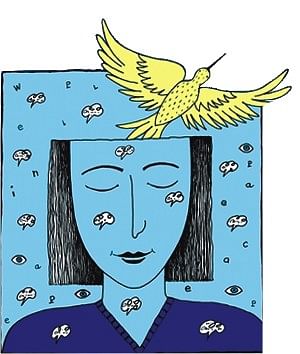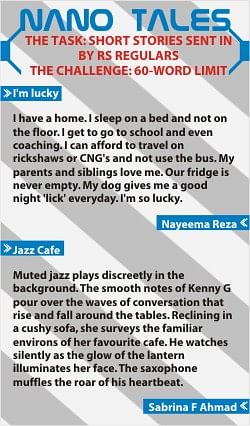

By Adnan Quadri
The most important things are the hardest things to say. They are the things we get ashamed of because words diminish our feelings, shrinking things that seem timeless when they in our head to no more than living size when they are brought out. Yet there are a few creative young writers trying to explore their mind and come up with beautiful words to express their ideas, thoughts and facts that touch many of us and leave us mesmerized. They are no different from us.
 Some of them approach the act of writing with nervousness, excitement, hopefulness or even despair, knowing they can never completely put onto the page what is in their minds and hearts. They sometimes come to the act with their fists clinched and their eyes narrowed. They sometimes come to it because they want a girl to love them or because they want to change the world. However they come to it, at the end of the day these young writers are the ones who accomplish the difficult task of articulating their emotions through the written word. To gain a little insight, we get up-close and personal with two young and upcoming writers of today; Nader Rahman who works for Star Weekend Magazine and Syed Tashfin Chowdhury who works in New Age.
Some of them approach the act of writing with nervousness, excitement, hopefulness or even despair, knowing they can never completely put onto the page what is in their minds and hearts. They sometimes come to the act with their fists clinched and their eyes narrowed. They sometimes come to it because they want a girl to love them or because they want to change the world. However they come to it, at the end of the day these young writers are the ones who accomplish the difficult task of articulating their emotions through the written word. To gain a little insight, we get up-close and personal with two young and upcoming writers of today; Nader Rahman who works for Star Weekend Magazine and Syed Tashfin Chowdhury who works in New Age.
RS: Why do you write?
NADER: That sounds easy to answer but now the more I think of it, the harder it becomes. I think the main reason people write is to have their opinions heard; whether it its poetry or prose, fact or fiction, their thoughts are implicit through their words. Thus writing a science fiction novel may be how a writer tries to have his opinion regarding a certain social matter be heard; in the same vein a poet may write a couplet to voice his political concerns. The essence is the same, they all have opinions to share and the medium is that of the written word. I see my self as no different, as a 'wannabe pseudorevolutionary' I feel there is much to say, from standing up for the marginalized to questioning the (very general) status quo, the what, where, when, how and most importantly why is what needs to be asked and pushed to its very limits. Without being pretentious, I would say I write to stretch the very elasticity of being. Not everything published with my by-line affirms what I have just said, but then again not everything I write is published.
TASHFIN: Well, I began my career in Daily Star as a Trainee Reporter in 2003. Back then, it was just curiosity and the urge to contribute to the society in any little way that I can. I started off writing for Star City and later also contributed to Star Tech
RS: What part of your job do you actually enjoy?
NADER: I have been a staff writer for well over a year now and honestly I love my job. It gives me the opportunity to explore research and write about thoughts, ideas and people I never would have come across if I were not with the Star Weekend Magazine. I think what I like best about the job are my co-workers and most importantly my boss. Aasha apa is the driving force behind my work because she is quite honestly the prefect boss. She assigns work and then without pressure will guide one through it and eventually heap all the praise on the one she tutored. In all the time I have come to work
with her, I have never brought myself to saying no to her, after all I put her through, it is the least she deserves.
TASHFIN: In 2006, I left DS and joined New Age as a Staff Writer. My field of work changed a bit as now I had to write for a weekly supplement called 'Xtra'. It was here that I realized that Journalism doesn't necessarily mean information dissipation. It also has to do with ample research, exhausting all the sources available for the particular issue, finding out connections between the particular incident and past ones, seeking the opinions of experts in the particular field and ultimately conveying to the reader, how this particular issue may have an impact in their lives in the short or the long run.
At New Age, there is also a scope for me to experiment and try out new forms of writing and presentation of the articles by contributing to the various sections. I believe I had done so well due to the support of some of my mentors like Morshed Ali Khan, Nafid Imran Ahmed, Mizanur Rahman at the Daily Star and Zayd Almer Khan, Mahtab Haider and Mubin S Khan at New Age. Although initially it was just curiosity, now its a passion and I realize now Mizan bhai and Morshed Uncle used to say, 'Once you are in it, you cant get out of it so easily!' about journalism.
RS: We all gathered some experience and memories while working. Tell us about some special events or situations that still stir you up or encourages you to write.
NADER: One incident which I think back to often is when on a Saturday we changed the cover story (which is a huge decision because the story and all the pictures should be complete by Tuesday at the latest) and Aasha apa urged me to turn what I thought  would be a one page story into a cover story! And that too I was only given three days to research it, interview people and then actually write it. Only through her endless encouragement and belief in me did I manage to produce the story, it was on the IMF and the World Bank and how they arbitrarily prescribe economic reforms for us. As it so happened the story turned out to be a huge success and all the plaudits came to me, but it really should have gone to my boss. That story taught me what real high-pressure work was and honestly I enjoyed every minute of stress, because I knew my boss was relying on me, it brought out the best in me. It was fantastic, frenetic fun.
would be a one page story into a cover story! And that too I was only given three days to research it, interview people and then actually write it. Only through her endless encouragement and belief in me did I manage to produce the story, it was on the IMF and the World Bank and how they arbitrarily prescribe economic reforms for us. As it so happened the story turned out to be a huge success and all the plaudits came to me, but it really should have gone to my boss. That story taught me what real high-pressure work was and honestly I enjoyed every minute of stress, because I knew my boss was relying on me, it brought out the best in me. It was fantastic, frenetic fun.
TASHFIN: There was this one particular incident that I remember. This had occurred sometime around 2005 that a newborn baby was found at this sand pile, with a dog and crows going at it. The old lady who found the baby took it and handed it over to the authorities. It was apparent that the baby was an unwanted child and had therefore been dumped so carelessly. The authorities soon handed her over to the DMCH. I was writing for Star City then and was assigned to cover this particular detail. I soon got there and as soon as I looked at her, I realized the pain she was in. She was on life support still and the right portion of her cheek and hands had been eaten away by the animals. But she still breathed! I stood there beside her for over 15 minutes watching her sleep and tried to contemplate why her mother or her father had deserted such a pretty little thing to this world. Somehow the emotion worked out well for the article and although Wahida Mitu, the co-writer for the issue and I received appreciation from my Star City peers, I still feel for the child. Wherever she is, I hope she is doing well.
RS: Any advice for our readers who love to write and want to develop their careers as writers?
NADER: Shane Warne says that any youngster who wants to be a leg spinner must only do one thing, and that is spin the ball, spin it as hard and as much as one can. Control will come later, with time and age, but when you're young all you need to do is spin the ball as much as you can, that is what is most important. My advice to young writers is along the same lines (pardon the pun): write as much as you can, mastering the art of writing will come with time, age and most importantly experience. Till then the best thing one can do is to keep writing. Think of yourself as Bacchus with the ink as your wine. Over and above that I'd say keep questioning things around you, the search for understanding even the ordinary will help in ones writing. Be innovative, revolutionary, don't copy a style, but create one of your own.
TASHFIN: There is a lot of potential out there. I believe that Bangladeshis are the most emotional bunch and due to their emotions and the way they feel, they have what it takes to be some of the most prolific authors or writers in the world. Why is there still a scarcity? Because there is this prevailing mind frame in our society that writers or journalists are people who don't make enough money to support a family and therefore lack the potential to make families work. This thought pattern is causing most young people to shy away from this sector. But over the last decade or so, this has been changing drastically. With the emergence of English newspapers and the Electronic media, along with online blogs, a new industry has opened up. It is easier for writers now to make a decent living and receive the recognition and exposure that they deserve. So, if anybody has the aim to become a writer they should not care about what others think. Because in the end, to society, its the success that matters, not the hardship that the individual had to go through to get to it. In order to do well in a newspaper or any such place, the best thing to do would be to research and read more international journals, news, reviews, research papers and other documents.
Watching English news channels like Al Jazeera (they have an unique presentation style) and BBC can also help. Once you have the confidence that you can write adequately, is when you should try to approach the reporters or the In-charges of the supplements of your favorite newspaper, where you would want to work. Most likely, the initial allowance will be extremely low. But you have to bear that for the success and thrill you are likely to enjoy in the future. So readers, keep writing about the things you hear and see everyday. Maybe someday you will be working with us. Until then keep up the good work. Au Revoir.

